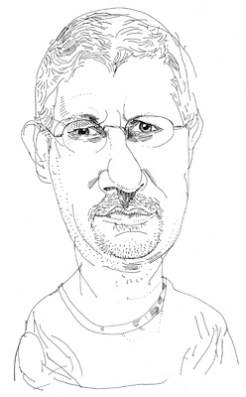Episode 603 – Nicholas Delbanco
Episode 560 – Adam Sisman
Episode 489 – Ira Nadel
Episode 480 – Nicholas Delbanco
Episode 451 – Jacques Berlinerblau
Episode 317 – Frederic Tuten
Episode 244 – Nicholas Delbanco
Episode 223 – Joe Ciardiello
Virtual Memories Show 223: Joe Ciardiello
Podcast: Play in new window | Download
Subscribe: Spotify | TuneIn | RSS | More
“There’s an improvisational nature, and a rhythmic nature to my drawing, building up certain areas, leaving other areas freer. I like the idea that less is more, both in music and in art.”
 Award-winning illustrator Joe Ciardiello reflects on 43 years as a freelancer, the jazz portraits that turned his career around, his drumming and how it influences his artwork, having more illustrator-friends than non-illustrator-friends, why he’d rather not be called a caricaturist, the time he was accused of ripping off the style of one of his idols, the search for perfect pen and paper (and how he keeps his Rapidographs working), and his amazing Spaghetti Journal project! Give it a listen!
Award-winning illustrator Joe Ciardiello reflects on 43 years as a freelancer, the jazz portraits that turned his career around, his drumming and how it influences his artwork, having more illustrator-friends than non-illustrator-friends, why he’d rather not be called a caricaturist, the time he was accused of ripping off the style of one of his idols, the search for perfect pen and paper (and how he keeps his Rapidographs working), and his amazing Spaghetti Journal project! Give it a listen!
“If I didn’t get off Staten Island before I was 50, I was going to die there.”
“I’m obsessed with line quality, to the point of sickness. I can’t find paper that makes me want to draw.”
Enjoy the conversation! Then check out the archives for more great episodes!
Lots of ways to follow The Virtual Memories Show! iTunes, Twitter, Instagram, Soundcloud, Facebook, Tumblr, and RSS!
About our Guest
 Joe was born and raised on Staten Island NY, just a short ferry ride to Manhattan where he attended The High School of Art and Design and college at Parsons, earning a BFA degree. Since 1974 he has worked for most major magazines and newspapers as well as for corporate and advertising clients, book publishers and record companies.
Joe was born and raised on Staten Island NY, just a short ferry ride to Manhattan where he attended The High School of Art and Design and college at Parsons, earning a BFA degree. Since 1974 he has worked for most major magazines and newspapers as well as for corporate and advertising clients, book publishers and record companies.
His clients have included: American Express, Audubon, Barnes & Noble.com, Capitol Records, Folio Society, The New York Times Book Review, The New Yorker, Politico, The Rock & Roll Hall of Fame, Rolling Stone, Sports Illustrated, Time and The Wall St. Journal.
Among his awards are four silver medals from the Society of Illustrators. In 2016 he was awarded the Society’s prestigious Hamilton King Award. Joe has been profiled in Communication Arts Magazine as well as other graphic arts journals. In 1999 he had a one-man exhibition of his work at the Society of Illustrators in New York. In 2007 Joe illustrated Elmore Leonard’s 10 Rules of Writing for Harper Collins and in 2011 a limited edition book of his blues musician portraits, BLACK WHITE & BLUES was published by Strike Three Press. His work is also included in the Taschen book 100 Illustrators
.
A musician as well, Joe plays drums with The Half-Tones, an illustrator jazz group. He lives in western New Jersey.
Credits: This episode’s music is Nothing’s Gonna Bring Me Down by David Baerwald, used with permission from the artist. The conversation was recorded at Joe’s home on a pair of Blue enCORE 200 Microphones feeding into a Zoom H5
digital recorder. I recorded the intro and outro on the same equipment in a hotel room in Los Angeles. All processing and editing done in Adobe Audition CC
. Photo of Mr. Ciardiello by me. Photo of me & his Philip Roth drawing by me. They’re on my instagram. Drawing of Joe by Joe.










